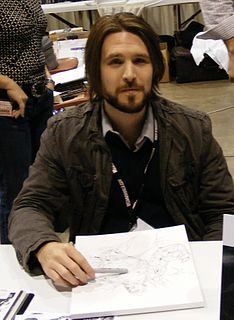A Quote by Terry Eagleton
Because subjects like literature and art history have no obvious material pay-off, they tend to attract those who look askance at capitalist notions of utility. The idea of doing something purely for the delight of it has always rattled the grey-bearded guardians of the state. Sheer pointlessness has always been a deeply subversive affair.
Related Quotes
All art is fundamentally subversive, because it upsets people's perceptions, their notions about society. Therefore, art is dangerous, but good art is always making us reassess our thoughts and feelings about how we relate to other people. There are always people who fear that and want to suppress that.
There are always forces at work in a society, certainly in America, which are really forces of censorship -either religious bodies or zealots who are always putting pressure on things, whether it's books or art or film. And all art is fundamentally subversive, because it upsets people's perceptions, their notions about society. Therefore, art is dangerous, but good art is always making us reassess our thoughts and feelings about how we relate to other people. There are always people who fear that and want to suppress that.
The most interesting to me were Doctor Strange, because he was so mystic, and Thor, because that was really cool. I mean, I had never been able to relate to the idea of a bearded guy in the sky, you know, and I'd always really liked mythology, and with Thor, it was like Stan Lee was actually saying, "Yeah, it's okay, there really is this Nordic god, there really is something besides the bearded guy in the sky". So I loved that!
Spending money on art has always been frowned upon in this country - even earlier, when my and others' paintings cost almost nothing. Something is always more important. The people in charge are always peddling reasons that others seem to accept. Those who don't drink and aren't crazy, or who don't attract attention with how they behave in public, aren't noticed in art.
The State, on the other hand, both in its genesis and by its primary intention, is purely anti-social. It is not based on the idea of natural rights, but on the idea that the individual has no rights except those that the State may provisionally grant him. It has always made justice costly and difficult of access, and has invariably held itself above justice and common morality whenever it could advantage itself by so doing.
I would have to say the most challenging thing about directing is the sheer stamina because... as a director, you're always doing something. Someone always needs to talk to you. There are always decisions to be made and every day for as long as the movie goes on. So it's a marathon... You don't have to look nice, but it's all day every day.
I have always felt that many Christians, deeply sincere Christians, support the idea of separation of State and Church and the secularist in that sense as well. They believe that religion should be very much a private affair and should not be given special treatment. The State should not fund churches for example.
That love is a conflict seems to me obvious and natural. There isn't a single worthwhile work in world literature based on love that is only about the conquest of happiness, the effort to arrive at what we call love. It's the struggle that has always interested those who produce works of art - literature, cinema or poetry.
I am opposing it with an idea of the history of philosophy as a history of philosophers, that is, a history of mortal, fragile and limited creatures like you and I. I am against the idea of clean, clearly distinct epochs in the history of philosophy or indeed in anything else. I think that history is always messy, contingent, plural and material. I am against the constant revenge of idealism in how we think about history.
Color is definitely an important factor for me during all phases of producing a cover. I always start out with a loose idea of what I want to see when I'm doing my initial sketches. This choice can be informed by anything, but I usually tend to lean toward more simple color schemes... something with a very obvious push between warms and cools.



































